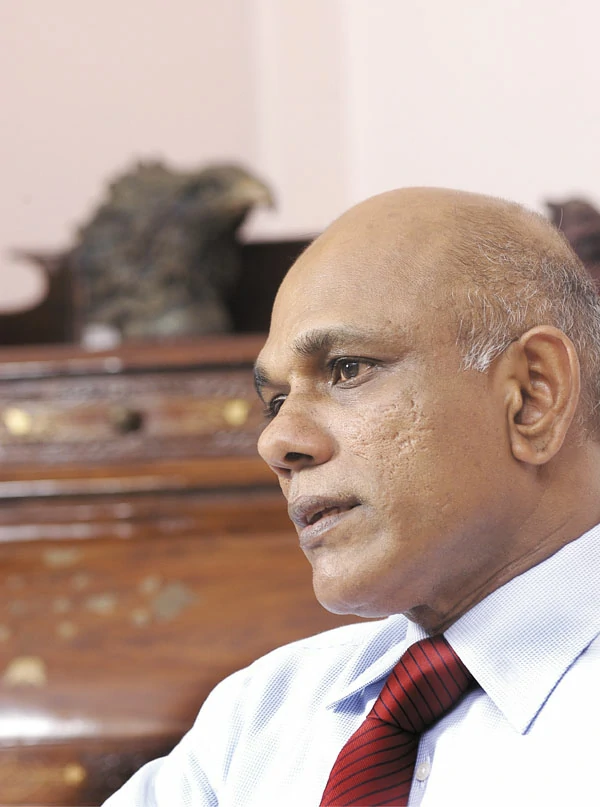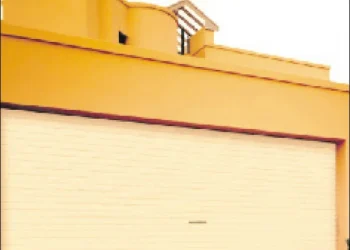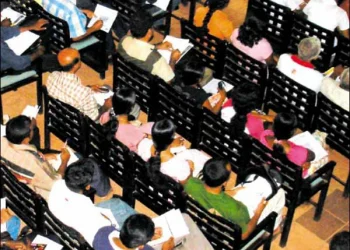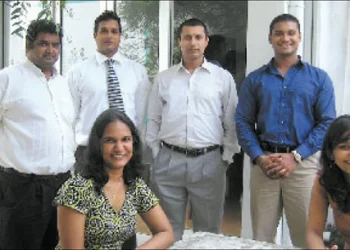
Referred to as one of the best bets in the gamble with smugglers, Mali Piyasena, Assistant Director of Customs of the Revenue Task Force (RTF) at the Department of Sri Lanka Customs talks to Business Today about the risks involved in the detection of smugglers, his 29-year-long service to the Sri Lanka Customs and the reasons behind his fame.
By Viranga Hewage and Anushika Gunawardana
Would you first tell us about how you entered this field and the type of duties and responsibilities that are performed by you?
I joined the Department of Sri Lanka Customs as an Assistant Superintendent of Customs in 1978. Sri Lanka Customs is divided into four divisions; namely, import, export, preventive and baggage, and I have worked in each. I was at my best at work, in relation to the Bandaranaike International Airport in Katunayake. Around 1985, I got a transfer as an Assistant Superintendent of Customs to the airport, where I gained insight into air travellers, observing and studying them and what they brought in with them, for about three months. This led me to understand the different ways in which they behaved.
My first arrest began with 4kgs of heroin, and as per the records available in the department, to date, I have made the highest number of detections of heroin. In fact, during my career at the Department, spanning 29 years, I have been involved in the detection of smugglers in narcotics, currencies, gold, silver, jewellery, mobile phones, vehicles, etc. to the value of Rs.265mn up to 2006.
Recently the largest detection of an attempt to smuggle in foreign currency and cheques, worth Rs.23mn, was made, where the suspects had swallowed the goods. What is of importance here, is that till now no arrests had been made of those smuggling in travellers cheques, since it is a new trend. In fact, Dr. Githanjana Mendis maintains that this detection is worthy of an entry in the Guinness Book of Records.
At present I am the Assistant Director of Customs of the RTF, which comes under the guidance of Sarath Jayathilleke, Director General of Customs.
Are you satisfied with the level of facilities available to you in the detection of illegal imports and exports?
As government workers we cannot expect many facilities, due to limited resources and technical support. These detections are usually made because of our skills and our ability to make the best of what we have been given.
What is your view of the current legal framework in Sri Lanka regarding the transport of illegal goods?
One has to keep in mind that Sri Lanka Customs has declared certain goods as restricted and prohibited or as needing special permits. For instance, if one is to import a vehicle, which is more than three-and-a-half years old, the Import – Export Controller’s permit is required. If the necessary formalities have not been met with, we can initiate action against that.
Are there instances when the process of detection become difficult?
In most instances I have not had to face such difficulties, since I use diverse methods that minimise such effects. Once there was a case, where in the process of taking a bag full of money into custody, we had to follow the suspects right up to the airplane. When we made the arrest, they threatened us, and I had to take appropriate steps. Of course, later they apologised. Overall, in my 29 years of service, such incidents have been very few.
“I Consider My Work As My Responsibility. Each Of The Director Generals Has Conferred Their Commendations Regarding My Work.”
The name ‘Mali Piyasena’ has become synonymous with any mention of Sri Lanka Customs. Would you say that your methodology in detecting illegal goods is the reason for this?
Maybe it is the judgement of the people, perhaps it may be my instinct and commitment. But if I were to address your query regarding my methodology, I can say that my methodology is to get quick results with minimum intervention to persons. I never prolong a case, even when an arrest has been made, since this constitutes an unnecessary influence and unpleasantness for people. I am aware that different views have materialised about arrests made by Sri Lanka Customs, as a result of which we have to face unwarranted incidents. As I mentioned earlier, the careful study I made of air travellers has enabled me to swiftly detect the transport of illegal goods.
Your profession is one fraught with danger and poses great risks to life. Do you follow special security measures when making arrests?
I do not follow any such special measure, but the government has given me some facilities, and if necessary we can obtain the support of the security forces. Of course, some officers have died in the line of duty and some have left the country in search of safety, but I have not faced such pressure in an excessive way. The duties and responsibilities of our profession is such, we cannot afford to constantly reflect on the risks involved. We give priority to our work, and perform alongside the dangers present, while resorting to the necessary measures as needed.
As I mentioned earlier, we expose ourselves to this type of risk only by pressuring the suspects in an undue manner and by exerting pressure on their private lives. If they understand that this is our job, then there is no risk. We always treat our suspects well, and make all necessities available to them.
On the other hand, most smugglers have connections with the under-world and various terrorist groups, and my life is also in danger within that context. I have been at the receiving end of many kinds of threats. Recently, in an incident related to assault and death threats by a smuggler, which was taken up at the Negombo Magistrate Court, the judge gave a severe warning and fined the smuggler. I am never fazed by these developments, and continue to offer my dedicated service to not only the Department of Sri Lanka Customs, but also the Sri Lankan government.
“Indeed, I Receive The Full Support Of Everyone At Sri Lanka Customs, From Sarath Jayathilleke, Director General Of Customs Downwards.”
In your professional life spanning nearly 30 years, what would you say is the most challenging arrest?
I have made arrests during my service that have never been made before during the history of Sri Lanka Customs. Once I took in a haul of gems worth Rs.2.5bn, which had been concealed in a jar of face cream. This can be referred to as one of the best detections I have made in the history of Sri Lanka Customs.
Another challenging incident is the recent arrests I made of smugglers who had swallowed currency in order to go undetected. It happened to be a day of fasting observed by Muslims across the world. Usually if we suspect someone of an unlawful activity, we offer food and drink to the suspects. The two Indians we had detained didn’t want to eat or drink, claiming that they did not want to break their fast. We had detained them on suspicion of transporting money illegally, and our suspicions were further confirmed by the conflicting statements they made. I had an instinctive suspicion as to whether they were carrying an undisclosed amount of money, apart from what they had with them. We then subjected them to medical tests. Once the X-rays came through we knew that they had swallowed something. Next they were admitted to the Negombo hospital, and for five days we stayed with the suspects, maintaining a very close observation on them, and collecting the currency and cheques as they passed these out of their system. We discovered that between the two of them, they had swallowed a combined number of 202 cylindrical bundles of foreign currency notes and travellers cheques, worth Rs.2.2bn. It was one of the most memorable experiences I have had in my professional life. Once an arrest of this nature takes place, the satisfaction I feel can never be measured in monetary terms.
Would you like to mention the commendations accorded to you in your service?
I consider my work as my responsibility. Each of the Director Generals have conferred their commendations regarding my work. The Dangerous Drug Control Unit has presented our division with an award for our work. Yet more than all these special awards, what I value the most is when people come up to us and offer their sincere praise and appreciation for the work we carry out.
What kind of support do you receive from the other officers in your division for work that is undoubtedly replete with responsibility?
Indeed, I receive the full support of everyone at Sri Lanka Customs, from Sarath Jayathilleke, Director General of Customs downwards.
Among the means with which government revenue is acquired, the income from Sri Lanka Customs occupies a primary position. In fact, raising state revenue is a special focus with President Mahinda Rajapaksa as well. How do you and your division contribute towards this goal?
The duty of my division and I is to offer the required service to the government in power. As the need arises, we conduct sudden inspections at the airport and other related places, and sometimes make arrests based on the information we acquire. Therefore it is our duty to ensure that the tax payments due to the government are paid and that swindlers are apprehended. In fact, as customs officers, this is our collective duty.
If the government is willing to offer us more help and provide more security for our officers, I believe that more qualitative service can be expected of these officers. If we ask for security it will be provided, but we need something more in order to fulfil our duty in bringing in more revenue to the government.
“It Is Our Duty To Ensure That The Tax Payments Due To The Government Are Paid And That Swindlers Are Apprehended .”
As an Assistant Director of Customs, is there a message that you would like to send out to society in general?
Be mindful of your goods and person. Once I apprehended four sisters of the same family, who had blenders stuffed with heroin, but these women had no idea as to what they were bringing. Investigations revealed that someone had taken the sisters on a tour of India, and sent them back to Sri Lanka, along with the blenders full of heroin. Therefore, what I would like to emphasise is the need to be constantly vigilant about whatever parcels you are carrying, irrespective of whether you are arriving in or leaving the country never carry others belongings when travelling. Our effort is to apprehend the small proportion of wrongdoers and to facilitate the large number of voluntary complaint customers.





